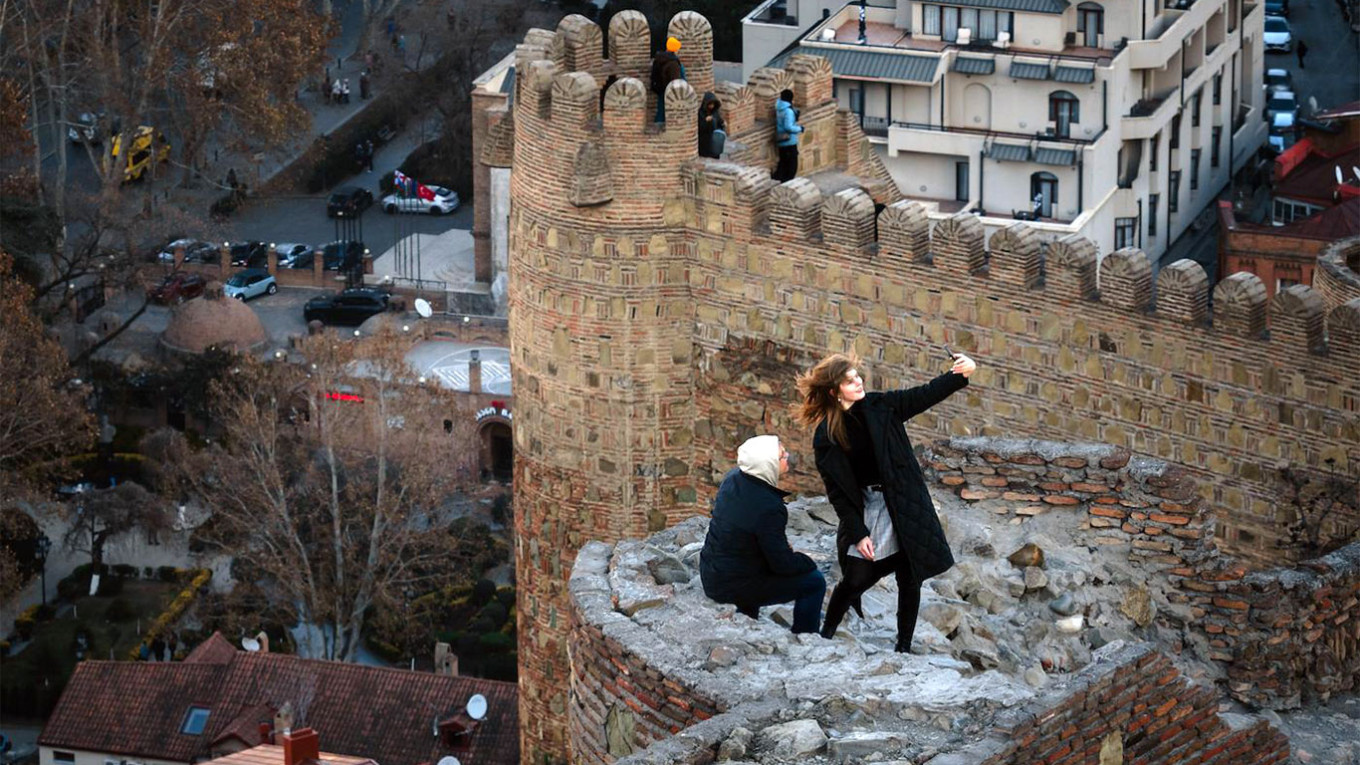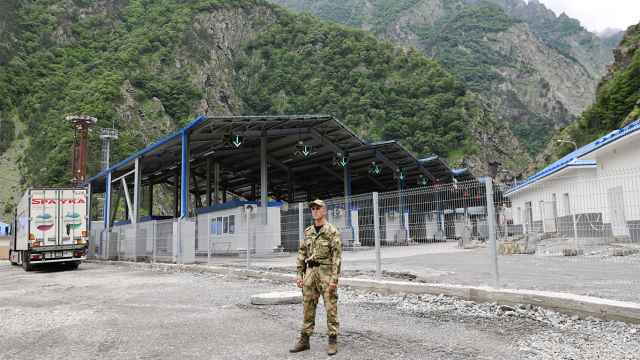TBILISI, Georgia – Alexei Yermolaev hardly expected that he’d be proposing to his girlfriend Anna Volshuva in the dead of night, surrounded by packed bags.
It was a few days after the start of Russia’s full-scale invasion of Ukraine in February 2022 and Yermolaev had just bought a one-way ticket to Tbilisi in the South Caucasus nation of Georgia amid rumors of mobilization and martial law.
Fleeing the country meant he’d be leaving Volshuva behind in St. Petersburg for the time being — and he didn’t want to get on his plane without solidifying his commitment. “I didn’t even have a ring,” recalled Yermolaev.
Despite the circumstances, Volshuva said yes.
Just over a year later, after Volshuva had followed him to Georgia, the couple were married in Tbilisi.
Russia’s February 2022 invasion of Ukraine and its “partial” mobilization in September sent hundreds of thousands of anti-war Russians fleeing abroad in a hurry. Amid the ongoing disruption and uncertainty, many subsequently decided to tie the knot.
While such marriages have happened in all the countries where fleeing Russians have settled, Tbilisi has become a matrimonial hub thanks to its relaxed marriage regulations.
Foreigners wanting to get married in Georgia only need to schedule a registration appointment at a government services building in Tbilisi — known as the House of Justice — provide notarized translations of their passports and show up to the appointment with two witnesses.
“It’s like Las Vegas,” said Volshuva.
“Outside of Tbilisi, there are even civil registration offices that are open 24/7… you just arrive, provide your passports and in two hours you’re married.”
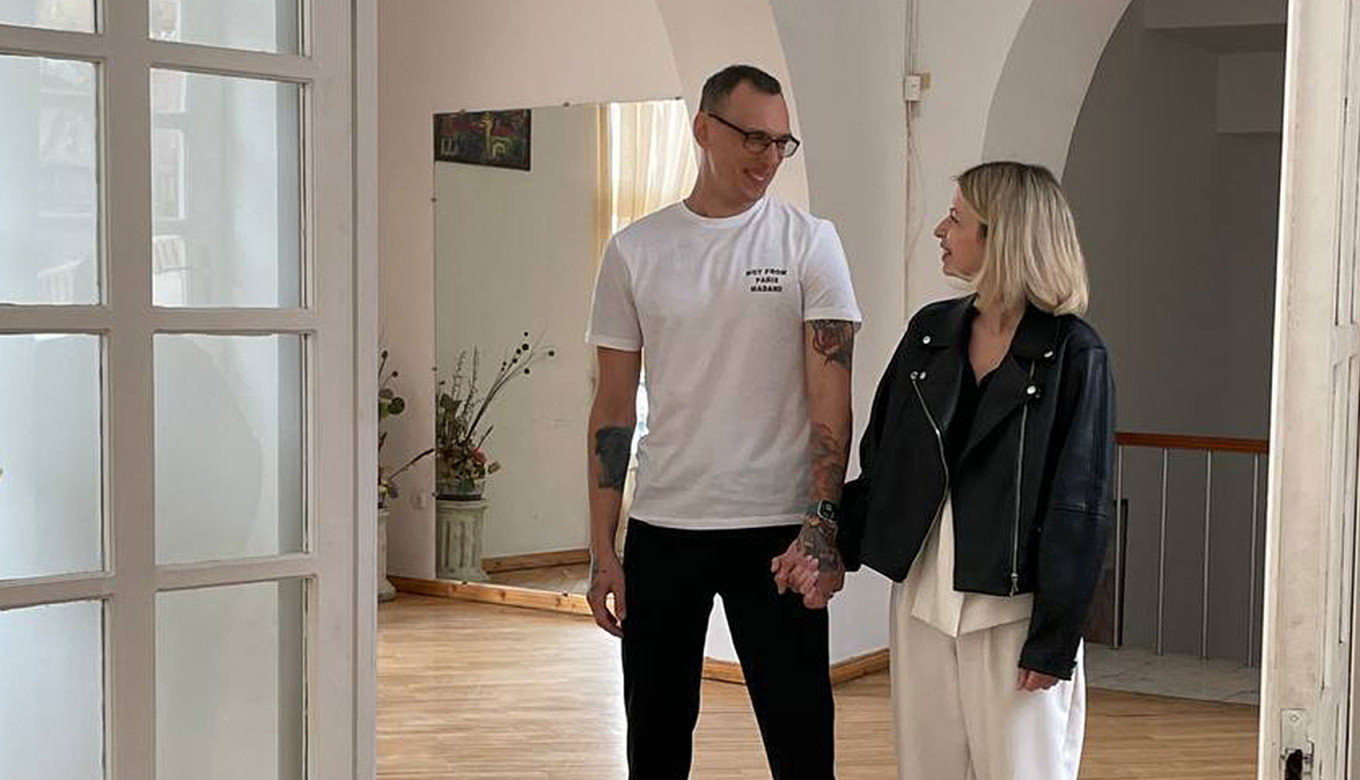
Although the Georgian government does not release data on the number of foreign couples who register marriages in the country, six newlywed Russian men and women who spoke to The Moscow Times all said they had friends and acquaintances who had also married in the South Caucasus country over the past year.
“In emigration, people are living in conditions of high uncertainty, and they want to devise concrete plans that can keep them going,” said sociolinguist Vlada Baranova, who is part of a team of independent researchers studying the emigration of Russians after the outbreak of the war in Ukraine.
“Without knowing what will happen tomorrow, [emigres] are doing all sorts of things to anchor themselves — it’s absolutely rational for even a young couple to get married in order to receive humanitarian visas and move, to get citizenship somewhere or something similar,” she said.
Baranova, who now lives and works in Helsinki, Finland, herself got married in Tbilisi after fleeing from Russia to Armenia last year.
“As long as my partner and I lived in the same country, there was never really any reason to get married. But then we realized that, as a legal couple, our lives outside of Russia would probably be made easier.”
Yermolaev and Volshuva said they had similar motivations when they decided to formalize their partnership in Tbilisi.
“There was so much uncertainty,” Yermolaev told The Moscow Times. “We needed to somehow ‘lock in’ our relationship.”
At Yermolaev and Volshuva’s marriage, they were joined by just three friends. Afterwards, the couple strolled the streets of downtown Tbilisi, enjoying the nighttime ambience, before going for a celebratory glass of wine.
While some Russian emigres have settled permanently in Georgia, tens of thousands more have stayed for just a few months — ultimately looking to travel further afield to countries in Europe, South America or Southeast Asia.
For such couples, marriage has been a way to facilitate an onward move.
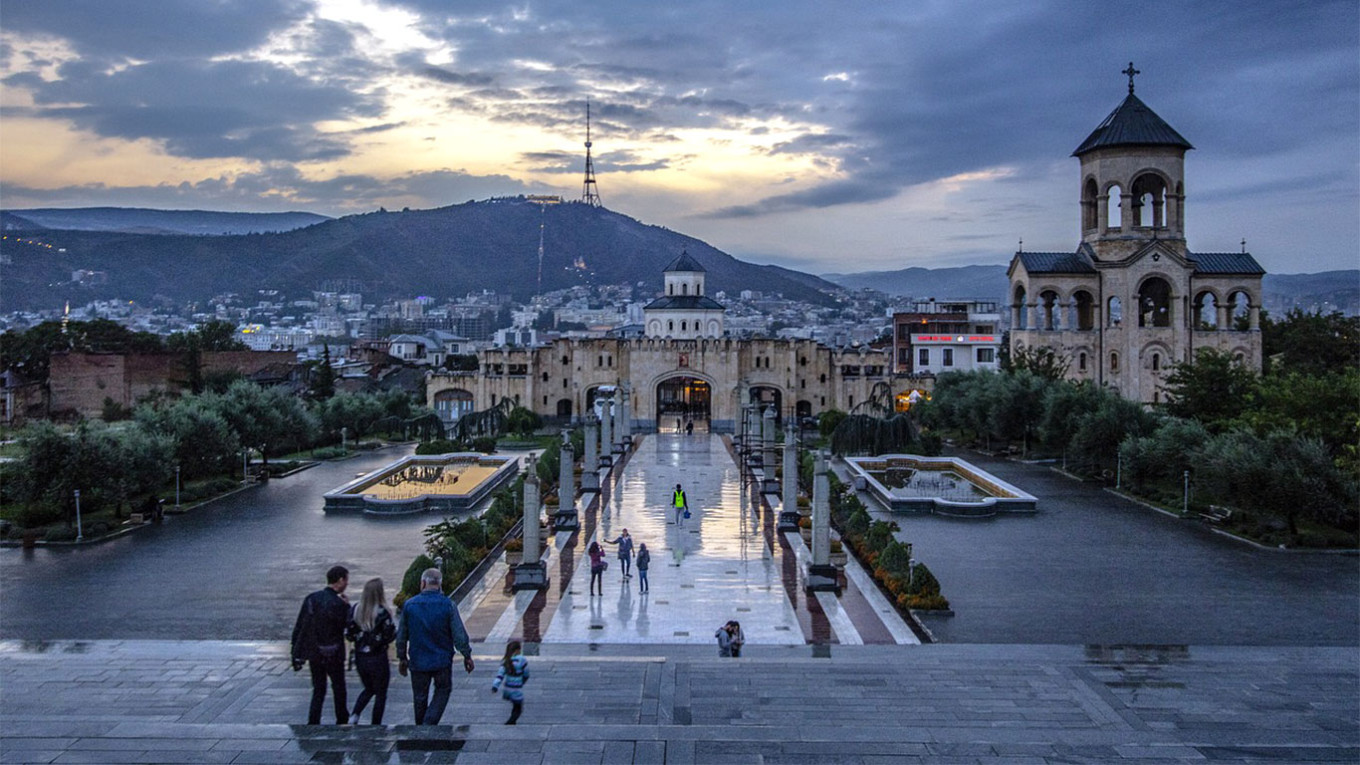
All of those who spoke to The Moscow Times said their plans for moving to another country were their primary motivation for getting married.
“For me, it was a kind of insurance for the future,” said Baranova.
“These practical steps are important for building a life in other countries, let’s say, for someone to ensure they receive a visa along with their spouse or maybe even for opening a business together somewhere.”
Russian couple Alexandra Barmina and Fyodor Veselov — who were married in the fall at Tbilisi’s House of Justice before moving to Germany — said obtaining a marriage certificate was crucial for their relocation.
The couple received humanitarian visas from Germany — but the nature of Germany’s immigration system means they could, theoretically, have been separated on arrival and sent to different cities if they could not prove their relationship was genuine.
“Maybe I’d be told to go live in Bavaria, and Sasha would go to Nuremberg,” said Veselov.
“We knew that we’d need to get married to avoid that kind of scenario.”
For the anti-war pair, their marriage in Georgia was simply a way to avoid the possibility of separation — rather than a romantic endeavor.
“We’ve always thought marriage to be this bureaucratic necessity, but nothing more,” said Barmina.
“Our relationship — which has been going on for more than a decade — hasn’t changed.”
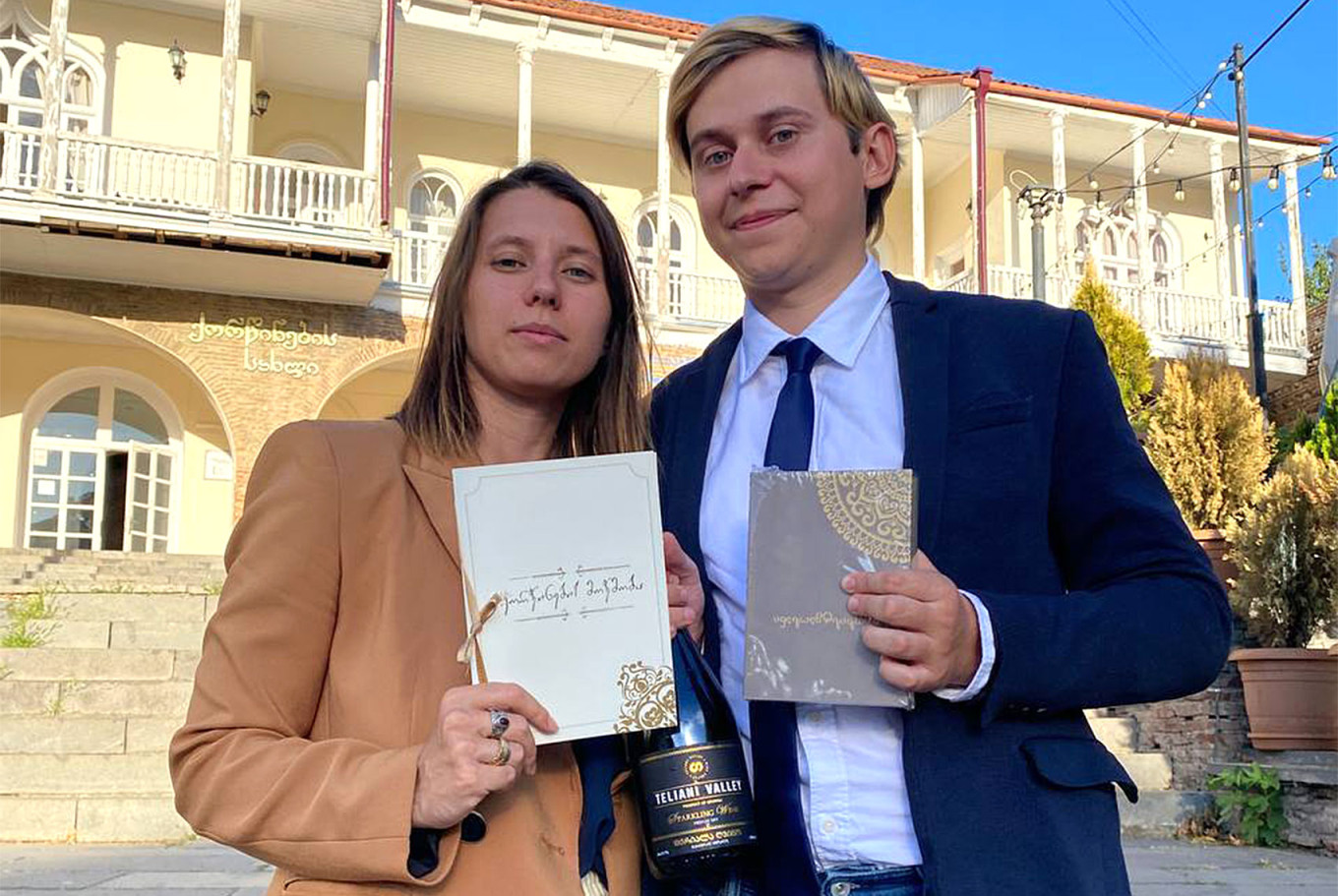
Not everyone getting married in Georgia is doing so with longtime partners. Some got to know their new spouses amid the uncertainty of the war and emigration.
Activist Yekaterina Alexandrova, who previously worked for Kremlin critic Alexei Navalny’s Anti-Corruption Foundation, met her now-husband Igor in Tbilisi just a week after she fled her home in Siberia.
“There was already one criminal case against me because of my political connections, and there was the threat that a second case would be opened. I had to leave immediately,” Aleksandrova said.
But her boyfriend at the time was not ready to pack up his life and move abroad, so they broke up.
Aleksandrova and Igor married in August after just a few months of dating and, like all the couples interviewed by The Moscow Times, decided to forego the pomp of a wedding ceremony.
“We can always have a wedding later,” said Alexandrova.
There is no official data on the exact number of Russians who have passed through Georgia, or who are still living in the country.
However, Georgian President Salome Zurabishvili said last month there were 80,000 Russians residing in Georgia. If accurate, that is significantly less than 112,000 Russians reportedly living in the South Caucasus nation after Russia’s September announcement of a “partial” mobilization.
Yermolaev, who fled from St. Petersburg at the start of the invasion, said he and his now-wife, Volshuva, were planning to relocate to Poland this year if they are able to gather all the needed documents.
However, the process will likely take many months and involve a lengthy period when they will, again, be living in different places.
“Emotionally, our marriage won't make it any easier for us to be apart for such a long time,” Yermolaev said.
“At least now we know we won't have any issues proving we’re a couple.”
A Message from The Moscow Times:
Dear readers,
We are facing unprecedented challenges. Russia's Prosecutor General's Office has designated The Moscow Times as an "undesirable" organization, criminalizing our work and putting our staff at risk of prosecution. This follows our earlier unjust labeling as a "foreign agent."
These actions are direct attempts to silence independent journalism in Russia. The authorities claim our work "discredits the decisions of the Russian leadership." We see things differently: we strive to provide accurate, unbiased reporting on Russia.
We, the journalists of The Moscow Times, refuse to be silenced. But to continue our work, we need your help.
Your support, no matter how small, makes a world of difference. If you can, please support us monthly starting from just $2. It's quick to set up, and every contribution makes a significant impact.
By supporting The Moscow Times, you're defending open, independent journalism in the face of repression. Thank you for standing with us.
Remind me later.



